-
 Bitcoin
Bitcoin $84,422.3862
-1.22% -
 Ethereum
Ethereum $1,579.4438
-1.72% -
 Tether USDt
Tether USDt $1.0000
0.00% -
 XRP
XRP $2.0539
-1.78% -
 BNB
BNB $589.6626
0.05% -
 Solana
Solana $137.3150
-1.67% -
 USDC
USDC $1.0000
0.00% -
 TRON
TRON $0.2451
0.93% -
 Dogecoin
Dogecoin $0.1543
-2.74% -
 Cardano
Cardano $0.6154
-1.90% -
 UNUS SED LEO
UNUS SED LEO $9.3292
0.64% -
 Chainlink
Chainlink $13.0166
1.86% -
 Avalanche
Avalanche $19.3938
-1.37% -
 Toncoin
Toncoin $2.9697
-0.37% -
 Stellar
Stellar $0.2415
-1.86% -
 Shiba Inu
Shiba Inu $0.0...01228
0.68% -
 Hedera
Hedera $0.1621
-2.21% -
 Sui
Sui $2.1055
-2.01% -
 Bitcoin Cash
Bitcoin Cash $334.5402
-0.94% -
 Polkadot
Polkadot $3.8448
3.11% -
 Hyperliquid
Hyperliquid $17.5557
-3.01% -
 Litecoin
Litecoin $76.0382
-0.15% -
 Dai
Dai $1.0000
0.00% -
 Bitget Token
Bitget Token $4.3529
-4.59% -
 Ethena USDe
Ethena USDe $0.9993
0.01% -
 Pi
Pi $0.6275
-3.58% -
 Monero
Monero $216.3249
1.59% -
 Uniswap
Uniswap $5.1978
-0.97% -
 Pepe
Pepe $0.0...07414
2.25% -
 Aptos
Aptos $5.0082
4.19%
consortium blockchain meaning
Consortium blockchains, governed by a select group of organizations, offer a permissioned, more controlled alternative to public blockchains, balancing decentralization with enhanced security and privacy for applications like supply chain management and finance.
Mar 20, 2025 at 10:49 pm

Key Points:
- A consortium blockchain is a permissioned blockchain network controlled by a group of pre-selected organizations.
- Participation is restricted, unlike public blockchains like Bitcoin or Ethereum.
- It offers a balance between decentralization and control, tailored for specific business needs.
- Governance, transaction validation, and consensus mechanisms are determined by the consortium members.
- Consortium blockchains find applications in supply chain management, healthcare, finance, and more.
Consortium Blockchain Meaning: A Deep Dive
The term "consortium blockchain" refers to a type of distributed ledger technology (DLT) where a select group of organizations jointly govern and maintain the blockchain network. Unlike public blockchains, which are open to anyone, consortium blockchains are permissioned, meaning access and participation are restricted to pre-approved members. This permissioned nature allows for greater control and privacy compared to public blockchains. The core principle revolves around shared governance and trust among participating entities.
How Does a Consortium Blockchain Work?
A consortium blockchain operates differently from a public blockchain. Instead of relying on a vast, anonymous network of miners for transaction validation, a consortium blockchain uses a pre-defined set of validators or nodes chosen by the participating organizations. These validators are responsible for verifying and adding transactions to the blockchain. The consensus mechanism, the method used to agree on the valid state of the blockchain, is typically chosen by the consortium members and might differ from the Proof-of-Work or Proof-of-Stake mechanisms used in public blockchains. Often, a variation like Practical Byzantine Fault Tolerance (PBFT) is employed.
Advantages of Using a Consortium Blockchain
Consortium blockchains offer several advantages over both public and private blockchains. The shared governance structure fosters trust and collaboration among participating organizations. The permissioned nature enhances security and privacy, protecting sensitive data from unauthorized access. The controlled environment allows for faster transaction speeds and higher throughput compared to public blockchains. This makes it suitable for applications requiring high performance and data integrity.
Disadvantages of Using a Consortium Blockchain
Despite its advantages, a consortium blockchain also has drawbacks. The permissioned nature can limit scalability and accessibility. The level of decentralization is reduced compared to public blockchains, raising concerns about potential centralization of power among the consortium members. The governance structure can be complex and require careful management to ensure fairness and transparency among all participants. Reaching consensus on decisions can be time-consuming.
Applications of Consortium Blockchains
Consortium blockchains find applications across various industries. In supply chain management, they provide enhanced traceability and transparency, tracking goods from origin to consumer. In healthcare, they enable secure sharing of medical records while maintaining patient privacy. Financial institutions utilize them for cross-border payments and trade finance, improving efficiency and reducing risks. Furthermore, consortium blockchains are used in digital identity management, voting systems, and other applications demanding high security and trust.
How is Consensus Achieved in a Consortium Blockchain?
The consensus mechanism is a critical aspect of any blockchain. In a consortium blockchain, the choice of mechanism is determined by the consortium members. Commonly used consensus mechanisms include Practical Byzantine Fault Tolerance (PBFT) and variations of Raft. These mechanisms ensure that all participating nodes agree on the valid state of the blockchain, even if some nodes are malicious or fail. The specific implementation depends on the requirements and characteristics of the network.
Who Controls a Consortium Blockchain?
A consortium blockchain is controlled by the participating organizations that form the consortium. These organizations collectively govern the network, making decisions on matters such as the consensus mechanism, transaction fees, and network upgrades. The governance structure varies depending on the specific consortium agreement. Some consortia might have a more centralized governance model, while others might opt for a more distributed approach. However, the key difference remains: it’s not open to the public.
What are the Key Differences Between Public, Private, and Consortium Blockchains?
Public blockchains, like Bitcoin, are open to anyone and are permissionless. Private blockchains are controlled by a single entity, offering maximum control but limiting decentralization. Consortium blockchains strike a balance, offering a degree of decentralization and control shared among multiple organizations. The choice between these types depends on the specific application and its requirements regarding security, privacy, and scalability.
Frequently Asked Questions (FAQs)
Q: Is a consortium blockchain truly decentralized? A: No, a consortium blockchain is not fully decentralized like a public blockchain. Decentralization is limited to the pre-selected members of the consortium.
Q: What are the security implications of a consortium blockchain? A: Security is generally higher than public blockchains due to the permissioned nature, but vulnerabilities still exist within the consortium itself, and attacks targeting validators are possible.
Q: How is data privacy handled in a consortium blockchain? A: Data privacy depends on the implementation and the consortium's policies. Encryption and access controls can be implemented to protect sensitive data.
Q: What are the costs associated with setting up and maintaining a consortium blockchain? A: Costs vary depending on the complexity of the network, the chosen technology, and the ongoing maintenance requirements. There are costs for infrastructure, development, and ongoing operation.
Q: What are some examples of real-world applications of consortium blockchains? A: R3 Corda, Hyperledger Fabric, and others are used in various applications, including supply chain tracking, financial transactions, and healthcare data management.
Disclaimer:info@kdj.com
The information provided is not trading advice. kdj.com does not assume any responsibility for any investments made based on the information provided in this article. Cryptocurrencies are highly volatile and it is highly recommended that you invest with caution after thorough research!
If you believe that the content used on this website infringes your copyright, please contact us immediately (info@kdj.com) and we will delete it promptly.
- Uniswap Founder Warns Ethereum Could Lose DeFi Edge to Solana
- 2025-04-20 23:05:13
- Duefe Recommends Holding 1,000 XRP to Enjoy Financial Freedom by 2029
- 2025-04-20 23:05:13
- Argentina introduces a managed float of the peso amid IMF-backed reforms
- 2025-04-20 23:00:13
- Kiran Khawaja of Fajar Realty Wins Real Estate Fashionista Award at International Deluxe Beauty Awards
- 2025-04-20 23:00:13
- As Protests Against Donald Trump's Administration Erupt, Bitcoin Emerges as an Unlikely Ally for Activists
- 2025-04-20 22:55:13
- Shiba Inu (SHIB) Price Surge Sparks Optimism, But Math Reveals Its Ceiling
- 2025-04-20 22:55:13
Related knowledge
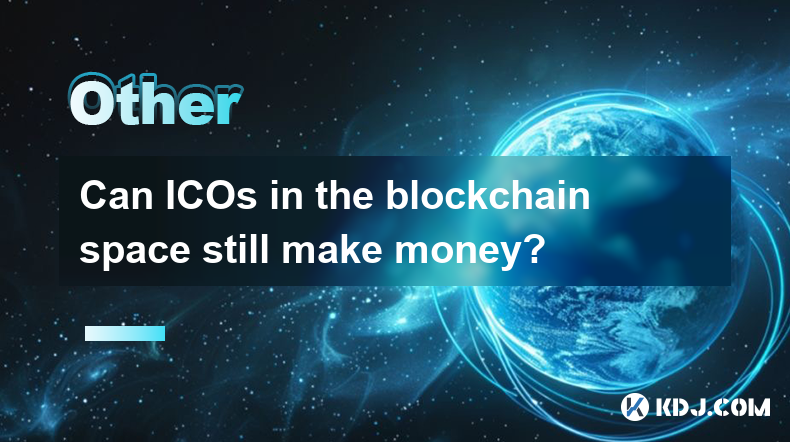
Can ICOs in the blockchain space still make money?
Apr 17,2025 at 08:29pm
The landscape of Initial Coin Offerings (ICOs) in the blockchain space has evolved significantly since their peak in 2017 and 2018. Despite the increased regulatory scrutiny and the rise of alternative fundraising methods like Security Token Offerings (STOs) and Initial Exchange Offerings (IEOs), ICOs can still be a viable way to raise funds and generat...
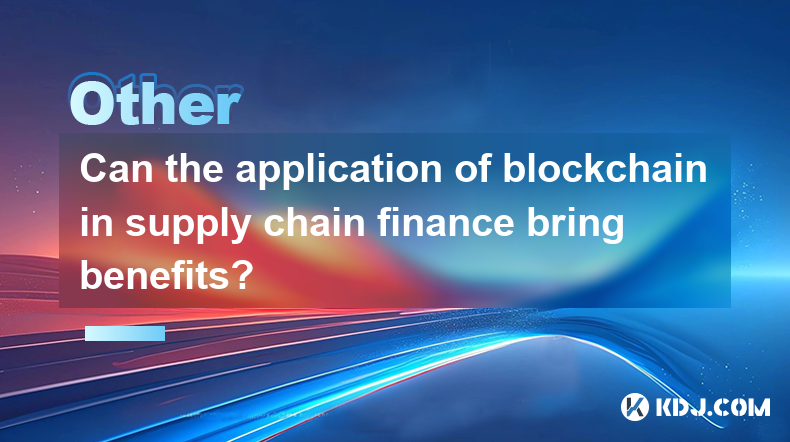
Can the application of blockchain in supply chain finance bring benefits?
Apr 15,2025 at 04:00pm
Can the application of blockchain in supply chain finance bring benefits? The integration of blockchain technology into supply chain finance has garnered significant attention in the cryptocurrency and financial sectors. This article explores how blockchain can potentially revolutionize supply chain finance, detailing its benefits and providing a compre...

Does the ranking of Chinese blockchain apps include cross-chain applications?
Apr 14,2025 at 04:00pm
The ranking of Chinese blockchain apps is a comprehensive evaluation that takes into account various aspects such as user base, transaction volume, and technological innovation. A pertinent question arises regarding whether these rankings include cross-chain applications. Cross-chain applications, which allow different blockchain networks to interact an...
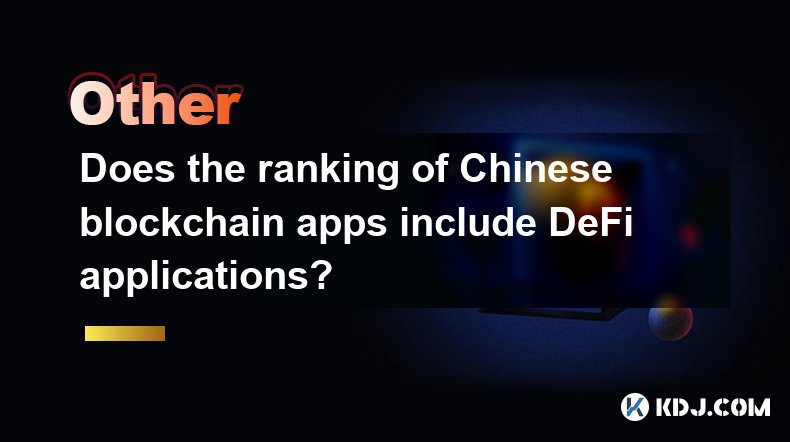
Does the ranking of Chinese blockchain apps include DeFi applications?
Apr 15,2025 at 06:57am
The ranking of Chinese blockchain apps is a comprehensive list that showcases the most popular and influential applications within the cryptocurrency ecosystem. One question that often arises is whether these rankings include DeFi applications. To answer this, we need to delve into the specifics of how these rankings are compiled and what types of appli...
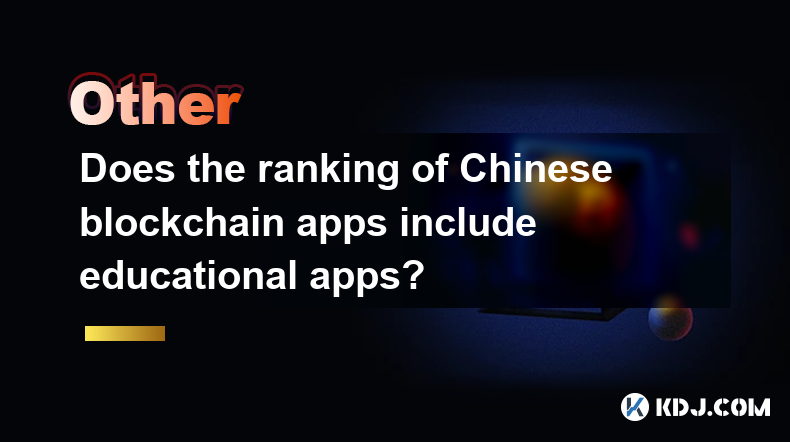
Does the ranking of Chinese blockchain apps include educational apps?
Apr 16,2025 at 03:35am
The ranking of Chinese blockchain apps often includes a variety of categories, from finance and gaming to social networking and beyond. One question that frequently arises is whether these rankings include educational apps. To address this, we need to delve into the specifics of how blockchain apps are categorized and ranked in China, and whether educat...
Does the ranking of Chinese blockchain apps include enterprise-level applications?
Apr 15,2025 at 06:42am
The ranking of Chinese blockchain apps often includes a variety of applications, ranging from consumer-focused to enterprise-level solutions. Understanding the scope and criteria for these rankings is essential to determine if enterprise-level applications are included. This article delves into the specifics of how Chinese blockchain app rankings are co...

Can ICOs in the blockchain space still make money?
Apr 17,2025 at 08:29pm
The landscape of Initial Coin Offerings (ICOs) in the blockchain space has evolved significantly since their peak in 2017 and 2018. Despite the increased regulatory scrutiny and the rise of alternative fundraising methods like Security Token Offerings (STOs) and Initial Exchange Offerings (IEOs), ICOs can still be a viable way to raise funds and generat...

Can the application of blockchain in supply chain finance bring benefits?
Apr 15,2025 at 04:00pm
Can the application of blockchain in supply chain finance bring benefits? The integration of blockchain technology into supply chain finance has garnered significant attention in the cryptocurrency and financial sectors. This article explores how blockchain can potentially revolutionize supply chain finance, detailing its benefits and providing a compre...

Does the ranking of Chinese blockchain apps include cross-chain applications?
Apr 14,2025 at 04:00pm
The ranking of Chinese blockchain apps is a comprehensive evaluation that takes into account various aspects such as user base, transaction volume, and technological innovation. A pertinent question arises regarding whether these rankings include cross-chain applications. Cross-chain applications, which allow different blockchain networks to interact an...

Does the ranking of Chinese blockchain apps include DeFi applications?
Apr 15,2025 at 06:57am
The ranking of Chinese blockchain apps is a comprehensive list that showcases the most popular and influential applications within the cryptocurrency ecosystem. One question that often arises is whether these rankings include DeFi applications. To answer this, we need to delve into the specifics of how these rankings are compiled and what types of appli...

Does the ranking of Chinese blockchain apps include educational apps?
Apr 16,2025 at 03:35am
The ranking of Chinese blockchain apps often includes a variety of categories, from finance and gaming to social networking and beyond. One question that frequently arises is whether these rankings include educational apps. To address this, we need to delve into the specifics of how blockchain apps are categorized and ranked in China, and whether educat...

Does the ranking of Chinese blockchain apps include enterprise-level applications?
Apr 15,2025 at 06:42am
The ranking of Chinese blockchain apps often includes a variety of applications, ranging from consumer-focused to enterprise-level solutions. Understanding the scope and criteria for these rankings is essential to determine if enterprise-level applications are included. This article delves into the specifics of how Chinese blockchain app rankings are co...
See all articles























































































